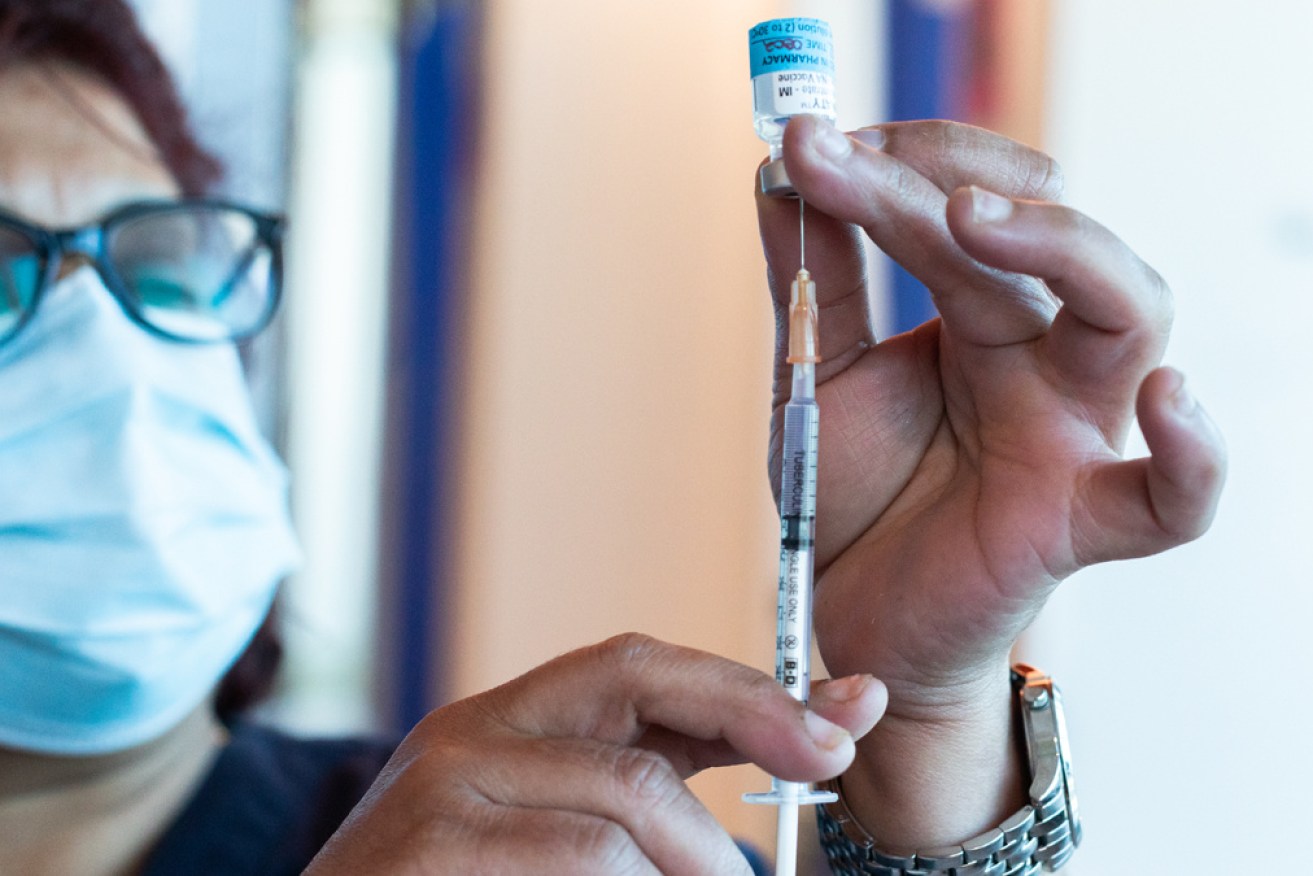Let us help out with vaccine rollout, says NAB chief


The National Australia Bank would be happy to help with the vaccine rollout as the nation negotiates its way out of the pandemic, says CEO Ross McEwan. Photo: AAP
The head of one of Australia’s largest employers says he would be happy to assist with the coronavirus vaccine rollout ahead of Australia’s borders being reopened.
NAB boss Ross McEwan told a parliamentary inquiry on Friday the bank could make vaccines available in a similar way to it offering flu shots.
“I will be encouraging all my colleagues at NAB to be vaccinated and will support them to do so,” Mr McEwan said.
“Last week as I had my flu shot at work, I was considering how large employers like NAB could assist with the rollout of the (COVID-19) vaccine.
“We would be happy to do so at the right time.”
The federal government has fallen well short of its initial target of vaccinating four million people by the end of March, with the latest data showing a shade more than 1.4 million people have received a jab.
Mr McEwan said Australia needed a national plan for living with the virus.
“Short-term lockdowns in capital cities disrupt travel plans, they undermine confidence and deter activity,” he said.
In addition, more arrangements like the travel bubble with New Zealand are needed.
“This will show that Australia can manage international arrivals which is critical for confidence,” Mr McEwan said.

The National Australia Bank would be happy to help with the vaccine rollout as the nation negotiates its way out of the pandemic, says CEO Ross McEwan. Photo: AAP
Mr McEwan’s sentiments have been echoed by employers who want say Australians must be prepared to live with a level of community transmission once borders are become more open.
Innes Willox, chief executive of peak employer body Ai Group said state and territory leaders needed to readjust their attitudes to risk management in order to begin a return to COVID normal.
Australians have been warned to prepare for rising coronavirus case numbers of up to 1000 a week when international borders open.
The news comes as authorities investigate the death of a 48-year-old woman in NSW who reportedly received a COVID vaccination before developing blood clots.
Prime Minister Scott Morrison asked people not to jump to conclusions about the woman’s death as state and federal agencies gather further information.
Mr Morrison on Thursday revealed his “first goal” to reconnect Australia to the rest of the world would be allowing vaccinated Australians to go overseas “for important purposes” and return home, without going into hotel quarantine, if they are vaccinated against COVID-19.
Australians under the age of 50 were last week warned off receiving the AstraZeneca COVID vaccine, after a link was confirmed between the jab and rare blood clots.
The warning added to delays in Australia’s vaccine rollout and made airlines’ preparation for an October restart for overseas travel look optimistic.
The federal government’s dumped timetable means Australia’s border is unlikely to reopen until 2022.
Senior government minister Simon Birmingham said experts were still looking at how reopening could work in line with the vaccine rollout.
The vaccines reduce the risk of serious health consequences from coronavirus.
“What is less clear are questions around the extent to which the vaccines reduce the rates of transmission,” Senator Birmingham told Sky News on Friday.
“So somebody who is vaccinated could still get COVID – the odds are they won’t get sick – but could they pass it on to somebody else who may not have been vaccinated?
“Those questions and analysis around transmission are a live piece of work happening around the world at present.”
Mr Morrison said Australians had become used to recording days of zero community transmission but that would need to change.
“If we were to lift the borders and people were to come, then you would see those cases increase,” he told 6PR radio.
“Australians would have to become used to dealing with a thousand cases a week or more.”
The government will also have to consider the possibility of Australians needing a third Pfizer jab, after the company’s boss predicted that would be the case to maintain protection against the virus.
Mr Morrison said states and territories would need to get on the same page about acceptable virus levels when travel restarts.
He continues to defend the vaccine rollout, rejecting comparisons with less developed nations at more advanced stages.
While mass vaccination centres are likely to administer the Pfizer and Novavax jabs later in the year, the prime minister rejected using major hubs to give doses of AstraZeneca to over-50s.
Despite doctors raising concerns about vaccine supply, Mr Morrison is adamant those issues have been largely solved.
Labor leader Anthony Albanese continues to criticise the government for its slow vaccine rollout, saying Australians stranded overseas should be home by now.
“We have GPs in this local community who don’t know when they’ll get vaccines, how many they’ll get and what the timetable is,” he said in Brisbane.
“This is a government that stands up for its own political interests.”
“It’s not on the side of Australians.”
More than 1.3 million people have been vaccinated since the program started in February, with the government missing its own targets.
-with AAP








